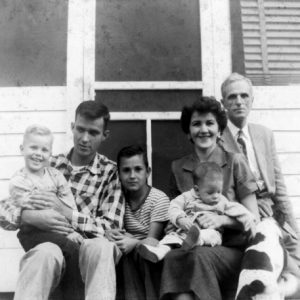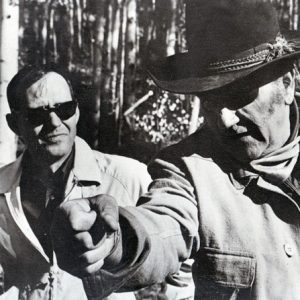calsfoundation@cals.org
Charles McColl Portis (1933–2020)
One of the finest of Arkansas’s fiction writers, Charles McColl Portis was best known for the western novel True Grit. Portis’s other novels—Norwood, The Dog of the South, Masters of Atlantis, and Gringos—are set in the twentieth century and are more purely comical. Whereas True Grit has sold copies into the millions and was made into films in 1969 and 2010 (with an Oscar-winning performance by John Wayne in the first adaptation), Portis’s other novels, though of high quality, have gone in and out of print over the years and have sold much more modestly. Portis’s protagonists are staid and ill at ease in modern society. The possibility of “true grit”—unyielding courage in the face of danger—is absent from the worlds of Portis’s later novels, all of which are populated by idiosyncratic but harmless wanderers, schemers, and “ne’er-do-wells” who stubbornly pursue their illusions.
Born in El Dorado (Union County) to Samuel Palmer Portis and Alice (Waddell) Portis on December 28, 1933, Charles Portis was raised and educated in various towns in southern Arkansas. His family, which included two brothers and one sister, settled in Hamburg (Ashley County) for his eighth- through twelfth-grade years. Portis served in the Marine Corps during the Korean War, reaching the rank of sergeant by the time of his discharge in 1955. He went to Korea as an infantryman and was stationed there for the duration of his service. After his discharge, he enrolled in the University of Arkansas (UA) in Fayetteville (Washington County) and graduated with a degree in journalism in 1958.
Portis wrote for both the UA student newspaper, Arkansas Traveler, and the Northwest Arkansas Times during his tenure as a student and, following his graduation, worked for various newspapers as a reporter, including nearly two years at the Arkansas Gazette—for which he wrote the “Our Town” column for a brief period—and four years at the New York Herald Tribune, which also employed Tom Wolfe, Lewis Lapham, and Jimmy Breslin at the time. His work for the Herald Tribune brought him back to the South many times to cover civil rights–related stories. After serving a year as the Herald Tribune’s London bureau chief and reporter, he left journalism in 1964, returned to Arkansas, and began writing fiction full time.
Portis’s first novel, Norwood (1966), established the writer’s preference for travel narratives with deadpan dialogue combined with amusing observations on American culture. Based in the mid-1950s, the novel’s loose plot concerns Norwood Pratt, a young, naïve, goodhearted ex-Marine living in Ralph, Texas, who is persuaded by con-man Grady Fring (the first of several such characters inhabiting Portis’s novels) to transport a pair of automobiles to New York City. Norwood comes into contact with a variety of unusual figures on the way to New York and back, including ex-circus midget Edmund Ratner (“the world’s smallest perfect fat man”), Joann (“the college educated chicken”), and Rita Lee, a pretty girl Norwood woos and wins on the bus ride back to the South. Norwood was made into a movie in 1970, with Glen Campbell playing the title character.
Like Norwood, Portis’s next novel, True Grit (1968), was serialized in condensed form in the Saturday Evening Post. Portis’s unqualified masterpiece, this short work is narrated by elderly Yell County native Mattie Ross who, at the time of the events described in the novel, is a prim, shrewd, strong-willed, Bible-quoting fourteen-year-old girl. When her father is murdered in Fort Smith (Sebastian County) by a hired hand, Tom Chaney, she recruits Deputy Marshal Rooster Cogburn—in whom Mattie sees one possessed, like herself, of “grit”—to help her hunt down Chaney and his outlaw band to “avenge her father’s blood.” Both satirical of westerns and realistic, the novel succeeds through its taut storyline, Mattie’s believable narrative voice, sharp dialogue, and a journalistic attention to details.
Though also a travel narrative, Portis’s succeeding novel is much less conventional than its predecessor. The Dog of the South (1979) is a picaresque, deadpan comic novel about a young man, Ray Midge, who tracks his runaway wife and her lover from Arkansas to Belize to retrieve his stolen car, credit cards, and perhaps the wife herself. The novel is filled with absurdly funny episodes and unique characters such as Dr. Reo Symes, “a born schemer” and the owner of a bus with “The Dog of the South” painted on its side. Even more droll, disjointed, and absurd, Masters of Atlantis (1985) is the episodic account of Lamar Jimmerson and the other founders/devotees of Gnomonism, a freemason-like society devoted to preserving the secret wisdom of the lost ancient city of Atlantis. Portis’s last novel was Gringos (1991), written from the point of view of Jimmy Burns, a conservative-minded American expatriate who lives in Mexico and works a variety of odd jobs. As with most of Portis’s fiction, Gringos is filled with a wide array of clownish characters, wry dialogue, observations on the minutiae of American (and in this case Mexican) life, and little plot.
A long-time resident of Little Rock (Pulaski County), Portis gained some notoriety and financial independence from film and paperback rights to Norwood and True Grit, but he consistently avoided the public spotlight. He was proclaimed by some as a “writer’s writer,” and several prominent critics and fellow writers—including Larry McMurtry, Roy Blount Jr., and Nora Ephron—heaped their praises on Portis’s work. In addition to his five novels, Portis also contributed shorter fiction and nonfiction articles to such periodicals as the New Yorker, the Atlantic Monthly, the Arkansas Times, and the Oxford American. He also wrote one play, Delray’s New Moon, which was performed as a reading by the Arkansas Repertory Theatre in April 1996. In 2010, Portis was honored with the Oxford American’s first Lifetime Achievement in Southern Literature award. In 2014, the Porter Prize presented its 30th Anniversary Lifetime Achievement Award to Portis.
Escape Velocity: A Charles Portis Miscellany—a compilation of Portis’s short fiction, nonfiction, and journalism, as well as his memoir and his play—was published by Butler Center Books in the fall of 2012, the same year he was diagnosed with Alzheimer’s disease, with a revised edition released in 2021.
Portis died in Little Rock on February 17, 2020. He is buried in Hamburg Cemetery.
In July 2022, the Library of America announced that it would be publishing an anthology of Portis’s writings, including his five novels and a selection of shorter works. That collection was released in April 2023. The following year, Portis’s papers were acquired by The Wittliff Collections at Texas State University in San Marcos. In its April 2025 issue, Harper’s Magazine published “The Keys to Veracruz,” a selection from an unpublished novel titled The Woman from Nowhere, a working manuscript of which had been found in Portis’s papers after his death.
For additional information:
Cep, Casey. “The Oddballs and Odysseys of Charles Portis.” New Yorker, April 10, 2023. https://www.newyorker.com/magazine/2023/04/17/charles-portis-books (accessed April 21, 2023).
Clancy, Sean. “Fans Get Peek at Unseen Novel 6.” Arkansas Democrat-Gazette, March 20, 2025, pp. 1A, 6A. Online at https://www.arkansasonline.com/news/2025/mar/19/magazine-publishes-never-seen-excerpt-by-late/ (accessed March 20, 2025).
Cochran, Robert. Haunted Man’s Report: Reading Charles Portis. Fayetteville: University of Arkansas Press, 2024.
Connaughton, Michael E. “Charles Portis.” Dictionary of Literary Biography. Vol. 6: American Novelists since World War II. Edited by James E. Kibler Jr. Detroit: Gale Research, 1980.
Horton, Kaleb. “The American Anthropology of Charles Portis.” Slate, February 20, 2020. https://slate.com/culture/2020/02/charles-portis-obit-true-grit-norwood-masters-atlantis-gringos.html (accessed February 21, 2020).
Jennings, Jay, ed. Charles Portis: Collected Works. New York: Library of America, 2023.
———. Escape Velocity: A Charles Portis Miscellany. Rev. ed. Little Rock: Butler Center Books, 2021.
Massey, Kyle. “Charles Portis, ‘True Grit’ Author and Arkansas Original, Dies at 86.” Arkansas Business, February 17, 2020. https://www.arkansasbusiness.com/article/130032/charles-portis-true-grit-author-and-arkansas-original-dies-at-86 (accessed February 17, 2020).
Moore, Bryan L. “Interrogating True Grit: Charles Portis’s Other Novels.” Journal of the American Studies Association of Texas 27 (1996): 19–34.
Nelson, Elizabeth. “Pure Nitro: 40 Years of Charles Portis’s Comic Masterpiece ‘The Dog of the South.’” The Ringer, February 1, 2019. https://www.theringer.com/2019/2/1/18206096/charles-portis-bill-hader-dog-of-the-south-novel (accessed February 17, 2020).
Portis, Charles. “Combinations of Jacksons.” The Atlantic Monthly 283 (May 1999): 81–92. Online at https://www.theatlantic.com/magazine/archive/1999/05/combinations-of-jacksons/308354/ (accessed February 17, 2020).
Reed, Roy. “Charles Portis, Elusive Author of ‘True Grit,’ Dies at 86.” New York Times, February 17, 2020. Online at https://www.nytimes.com/2020/02/17/obituaries/charles-portis-dead.html (accessed February 17, 2020).
———. “Interview with Charles Portis, Little Rock, Arkansas, 31 May 2001.” Arkansas Gazette Project. David and Barbara Pryor Center for Arkansas Oral and Visual History. University of Arkansas Libraries, Fayetteville, Arkansas. Online at https://pryorcenter.uark.edu/project.php?thisProject=2 (accessed February 17, 2020).
Roberts, Jeannie. “Author, Arkansas Native Charles Portis Dead at 86.” Arkansas Democrat-Gazette, February 18, 2020. Online at https://www.arkansasonline.com/news/2020/feb/18/author-portis-dead-at-age-86-20200218/ (accessed February 18, 2020).
Rosenbaum, Ron. “Our Least-Known Great Novelist.” Esquire 129 (January 1998): 30. Online at https://classic.esquire.com/article/1998/1/1/our-least-known-great-novelist (accessed February 18, 2020).
Stephenson, Will. “Signs and Wonders.” Harper’s Magazine, April 2023. Online at https://harpers.org/archive/2023/04/charles-portis-collected-works-review-true-grit/ (accessed March 30, 2023).
Tartt, Donna. “Donna Tartt on the Singular Voice, and Pungent Humor, of Charles Portis.” New York Times, June 9, 2020. https://www.nytimes.com/2020/06/09/books/charles-portis-true-grit-dog-of-the-south-gringos-masters-of-atlantis.html (accessed June 29, 2020).
Tower, Wells. “What Charles Portis Taught Us.” New Yorker, February 20, 2020. Online at https://www.newyorker.com/culture/postscript/what-charles-portis-taught-us (accessed February 21, 2020).
Bryan L. Moore
Arkansas State University











Gregory Kearse: I too, saw the Masonic references and went to search if Portis was a Mason. The very obscure reference to the Supreme Temple of the International Order of Rainbow for Girls located in McAlester, OK, caught my attention as I am a Majority Member of the group.
While it is not clear that writer Charles Portis was a freemason, it is interesting that he would use masonic references related to the main character (who has died). The ideals of freemasonry are perhaps revealed through his daughter Mattie, who clearly adored and respected her father. Mattie is shown as a smart, frugal, determined, clear-headed person. Perhaps her vim and vigor give reference to the masonic principle of steadfastness, openness, and fair dealing. The masonic references are quite intriguing. As the current editor/writer of the Scottish Rite Journal, I am always on the lookout for material which favorably highlights the good of freemasonry that is highlighted in social media and the general culture.